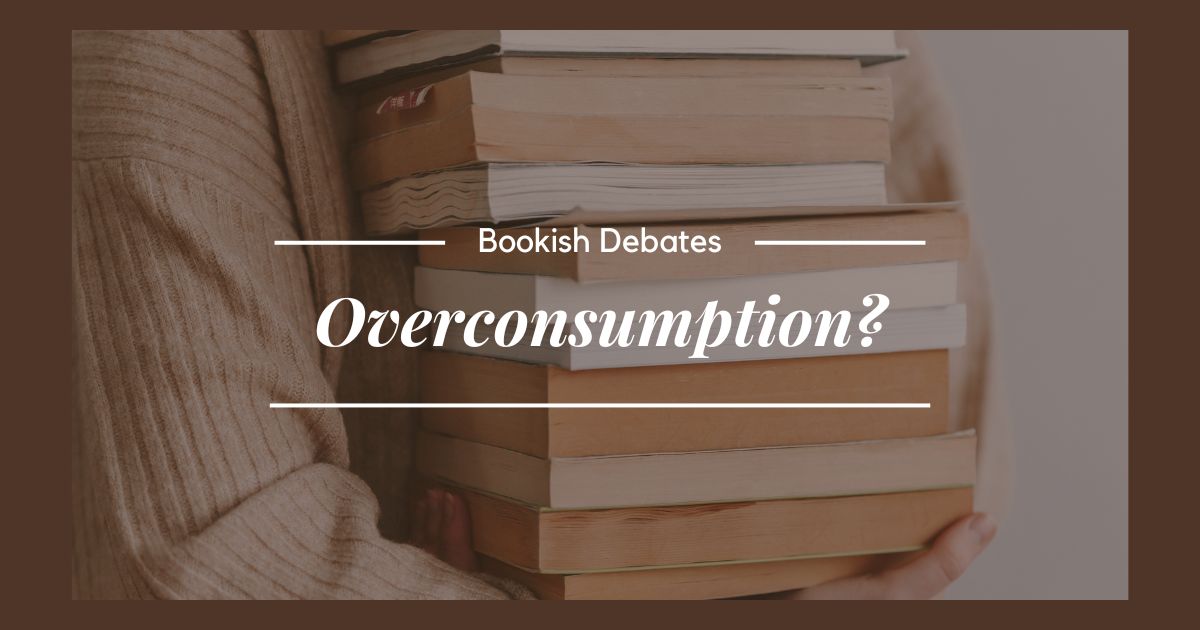If you frequent bookish social media, you may have seen a few posts and videos discussing the concept of overconsumption as it relates to reading. Many are decrying recent trends as encouraging a vapid and shallow engagement with books.
I have a lot of thoughts on the matter, so buckle in. I’ve linked my information sources throughout.
It’s not the same as fast fashion.
This is the most prominent comparison I’ve seen in the bookosphere lately, that the overconsumption of books is akin to the world of fast fashion. It’s not.
That’s not to say there isn’t an overconsumption problem (I’ll get to that in a moment). But it’s a gross overestimation to compare buying too many books to the global phenomenon of fast fashion that’s leading to high amounts of pollution and unfair labor practices.
- Fast fashion is rightly criticized for it’s impact on the planet. Because these clothes are made cheaply, they often fall apart before too long. Then people throw them away, adding to the global issue of trashed clothes in landfills and in the ocean.
- People aren’t throwing away their books at the same rates. There are not mountains of trashed books clogging up our infrastructure. Readers will likely keep their books for years, and when it’s time to get rid of them, they will be donated or sold to others. I mean, it’s practically a cardinal sin to harm a book.
- Fast fashion relies on cheap labor, which leads to exploitation. Companies will set up shop in countries with lax labor laws so they can pay lower wages and therefore sell cheaper clothes.
- The publishing industry couldn’t get away with this. We often see strikes and boycotts for better working conditions.
- This is related to point 1, but fast fashion profits from built-in obsolescence. Many consumer goods today aren’t made to last, because they want you to buy it again.
- Books may have trends, just like anything else, but they’re also timeless. A book doesn’t lose it’s inherent value after being read. They can be read and reread, and then given to someone else.
We should be wary of overconsumption, though.
Overconsumption is always worth analyzing critically. Do we need to buy books before we plan to read them? How much is too much? How many unread books is it okay to have, and how many is pushing the limit? Should we mind the companies we support in the process?
It’s easy to see why the fast fashion comparison is brought to the table. With “book haul” videos circulating online, it’s hard not to draw comparisons to the similar “fashion hauls.” It leads to questions of authenticity; are they buying this many books because they really plan to read all of them, or is it for views? Are they actually interested in all of those books, or were they just trendy?
I don’t think these situations apply to the majority of readers, or even the majority of readers online. A very small percentage of readers have any kind of book blogging presence on the Internet, and an even smaller percentage of those have these kinds of videos. To make much ado about these influencers is likely giving too much credit to availability bias.
Can you really read too much?
Another aspect of this debate usually relates to the number of books some people read in a year. Some think it’s outlandish to read a large number of books. Others say it’s actually pretty easy and happens without trying.
I’m in a few reader Facebook groups, and every January there will be good-natured posts from readers sharing their reading goals and asking others to share theirs. Every time, without fail, some users come out of the woodwork to comment that having a numbered reading goal is “ridiculous” and that reading should just be for fun. Obviously, the idea that setting a reading goal is part of the fun eludes them.
In 2022, my reading goal was 35 and I ended up reading 50. So in 2023, I raised my goal to 60 to see if it would be a stretch, and I ended up hitting 100 for the first time ever – mostly because I tried new things like audiobooks and graphic novels. Reading goals can be a great way to encourage new reading experiences.
Despite the high number, I feel confident in the amount to which I remember my reading experiences with each one. To be fair – I’m a book blogger. I post reviews every week, and staying on top of trends is important to me, therefore of course I read that much. I can, so I do, and my lifestyle permits it.
But that’s not to say there isn’t a reasonable limit. I’m definitely skeptical of reading counts much higher than 100. I’ve seen a few book bloggers with 200 and 300 read counts for a year, and then they all but disappeared because they had obviously burned out.
Book collecting isn’t the same as overconsumption.
While we’re talking about this, I want to point out that collecting things is a hobby, also. Beyond collecting the books themselves, it’s not unheard of for people to also collect multiple editions of a book they really love, especially any kind of special edition or a first edition printing. Some even amass specialized collections that can be worth a lot of money.
I think this aspect is only brought up in the overconsumption conversation because of the rise in sprayed edges. For some reason, this bothers some people. The only reason I can think of is that these special editions are often bright and colorful, or have special designs, and are therefore really fun to look at. There’s sometimes a bias against fun things in the book world, especially if you’re talking to someone who views reading as a serious affair. (These are also the kind of people who snub fantasy, romance, sci-fi, or anything else that’s popular and beloved and accessible.)
I don’t see this same concern about collecting special editions like the Penguin clothbound classics, or the Easton Press leather bound editions. Going a step further, I also don’t see overconsumption conversations started about any other kind of collecting – like records, LEGO sets, toy trains, action figures, etc. And those can be even more expensive hobbies.
If someone has a problem with book collecting, but not any other kind of collecting, they don’t actually have a problem with collections. It’s the books they take issue with.
Keep doing your thing.
Don’t let the snobs get you down. If reading goals and book collecting are your jam, don’t let anyone shame you for it.
I would love to have you around! Subscribe below.
Check out some of my other recent blogs:








2 responses to “The Book Overconsumption Debate: It’s not fast fashion”
Books, legos, and records for the win
The perfect trifecta of collections